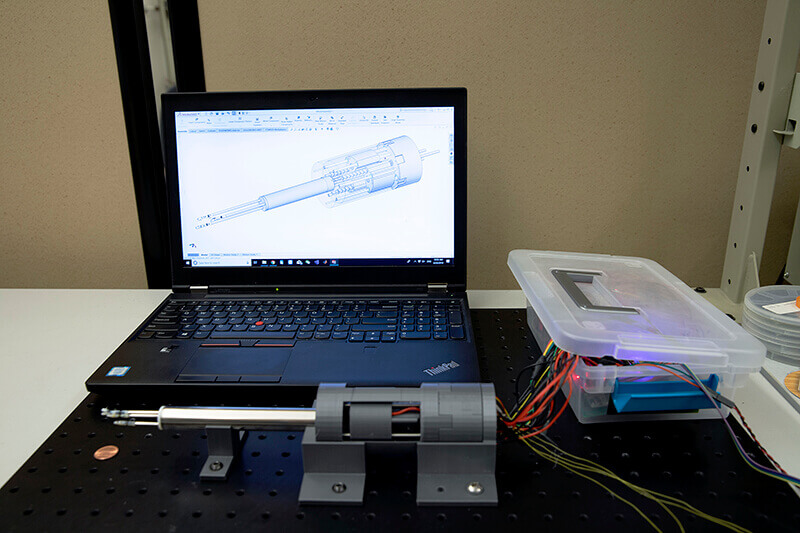July 18, 2018
Aching backs could get relief from technology to improve back surgery outcomes, reduce pain, advance skills of surgeons
WEST LAFAYETTE, Ind. – The majority of adults in the United States experience lower back pain at some point in their life. Thousands undergo surgery to help fix their backs – but the procedures can be expensive and not always effective because the spinal area is small, is intricate and presents space challenges for surgeons.
Now, a Purdue University-affiliated startup has developed new technology to help make the surgeries more effective and less painful. A video about technology is available at https://youtu.be/RkzNDWCSR2o.
C2 Medical Robotics Inc., co-founded by David Cappelleri, an associate professor of mechanical engineering in Purdue’s College of Engineering, also aims to improve the skills of surgeons with its new technology.
 C2 Medical Robotics, Inc., co-founded by David Cappelleri, an associate professor of mechanical engineering in Purdue’s College of Engineering, developed robotic spinal surgical tools and devices. (Purdue Research Foundation image/Hope Sale)
Download image
C2 Medical Robotics, Inc., co-founded by David Cappelleri, an associate professor of mechanical engineering in Purdue’s College of Engineering, developed robotic spinal surgical tools and devices. (Purdue Research Foundation image/Hope Sale)
Download image
Lower back pain is one of the most common complaints of patients in the United States. In fact, up to 80% of Americans suffer from back pain at some point, with more than 3 million cases of spinal disc herniation occurring per year, according to Cappelleri. Over 350,000 lumbar discectomy procedures are performed per year, which is the most common surgical technique to treat herniated discs.
“We developed low-cost, articulated, robotic spinal surgical tools and devices for a common surgical procedure called lumbar discectomy,” Cappelleri said. “With the help of multi-material 3D printing, we can shrink existing robotic systems to fit into the small workspace of the spine making it easier for surgeons to perform this delicate surgery.”
This method replaces traditional pin joints with compliant joints, which are printed out of soft, rubber-like material. The rigid components are printed out of hard plastic material. This all comes out of the printer as one integrated mechanism, which is hooked up to tendon wires to drive it. The technology is then controlled by joysticks and onboard actuators.
Cappelleri said one of the biggest advantages for patients is the softer tool that leaves less trauma compared with conventional rigid tools. It also allows for smaller incisions than traditional open surgeries or the alternative, which is micro-endoscopic surgery.
Cappelleri said the robotic system also improves the skills of the surgeon by providing more dexterous movement and control of the tools in the surgical workspace. Some surgeons may not have been skilled enough to do the manual procedure in the past, but the robotic system opens up opportunities for people to receive this procedure where they may not have been able to before.
“The hope is we can help people and reduce their pain,” said Cappelleri, who has been working in the medical device industry for over a decade. “For surgeons, we want to make their job easier, and just make it a low-cost system that can be adopted by many hospitals and medical centers, so it becomes the standard for these types of procedures.”
C2 Medical Robotics also recently received the Purdue Black Award, which awards seed stage companies with an investment through the Elevate Purdue Foundry Fund. C2 Medical Robotics intends to use the $20,000 investment to gather the components needed to build an integrative prototype system.
This technology is licensed through the Purdue Research Foundation Office of Technology Commercialization.
The work aligns with Purdue's Giant Leaps celebration of the university’s global advancements made in health as part of Purdue’s 150th anniversary. It is one of the four themes of the yearlong celebration’s Ideas Festival, designed to showcase Purdue as an intellectual center solving real-world issues.
About Purdue Research Foundation Office of Technology Commercialization
The Purdue Research Foundation Office of Technology Commercialization operates one of the most comprehensive technology transfer programs among leading research universities in the U.S. Services provided by this office support the economic development initiatives of Purdue University and benefit the university's academic activities. The office is managed by the Purdue Research Foundation, which received the 2016 Innovation and Economic Prosperity Universities Award for Innovation from the Association of Public and Land-grant Universities. For more information about funding and investment opportunities in startups based on a Purdue innovation, contact the Purdue Foundry at foundry@prf.org. For more information on licensing a Purdue innovation, contact the Office of Technology Commercialization at otcip@prf.org. The Purdue Research Foundation is a private, nonprofit foundation created to advance the mission of Purdue University.
Writer: Jacqueline Lenz, jvlenz@prf.org
Purdue Research Foundation contact: Chris Adam, 765-588-3341, cladam@prf.org
Source: David Cappelleri, dcappell@purdue.edu

